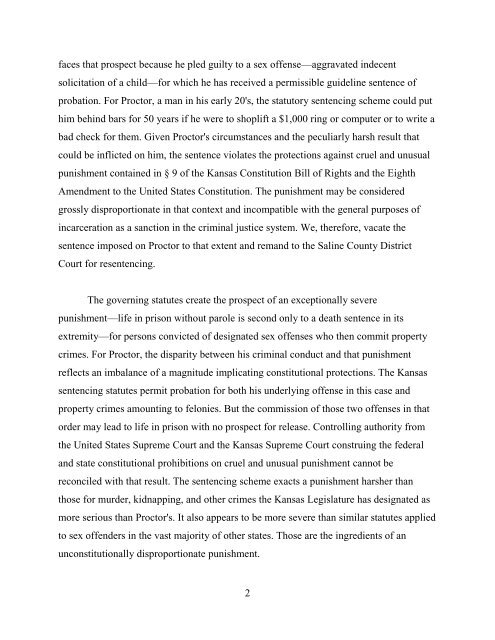State v. Proctor - Kansas Judicial Branch
State v. Proctor - Kansas Judicial Branch
State v. Proctor - Kansas Judicial Branch
You also want an ePaper? Increase the reach of your titles
YUMPU automatically turns print PDFs into web optimized ePapers that Google loves.
faces that prospect because he pled guilty to a sex offense—aggravated indecent<br />
solicitation of a child—for which he has received a permissible guideline sentence of<br />
probation. For <strong>Proctor</strong>, a man in his early 20's, the statutory sentencing scheme could put<br />
him behind bars for 50 years if he were to shoplift a $1,000 ring or computer or to write a<br />
bad check for them. Given <strong>Proctor</strong>'s circumstances and the peculiarly harsh result that<br />
could be inflicted on him, the sentence violates the protections against cruel and unusual<br />
punishment contained in § 9 of the <strong>Kansas</strong> Constitution Bill of Rights and the Eighth<br />
Amendment to the United <strong>State</strong>s Constitution. The punishment may be considered<br />
grossly disproportionate in that context and incompatible with the general purposes of<br />
incarceration as a sanction in the criminal justice system. We, therefore, vacate the<br />
sentence imposed on <strong>Proctor</strong> to that extent and remand to the Saline County District<br />
Court for resentencing.<br />
The governing statutes create the prospect of an exceptionally severe<br />
punishment—life in prison without parole is second only to a death sentence in its<br />
extremity—for persons convicted of designated sex offenses who then commit property<br />
crimes. For <strong>Proctor</strong>, the disparity between his criminal conduct and that punishment<br />
reflects an imbalance of a magnitude implicating constitutional protections. The <strong>Kansas</strong><br />
sentencing statutes permit probation for both his underlying offense in this case and<br />
property crimes amounting to felonies. But the commission of those two offenses in that<br />
order may lead to life in prison with no prospect for release. Controlling authority from<br />
the United <strong>State</strong>s Supreme Court and the <strong>Kansas</strong> Supreme Court construing the federal<br />
and state constitutional prohibitions on cruel and unusual punishment cannot be<br />
reconciled with that result. The sentencing scheme exacts a punishment harsher than<br />
those for murder, kidnapping, and other crimes the <strong>Kansas</strong> Legislature has designated as<br />
more serious than <strong>Proctor</strong>'s. It also appears to be more severe than similar statutes applied<br />
to sex offenders in the vast majority of other states. Those are the ingredients of an<br />
unconstitutionally disproportionate punishment.<br />
2

















